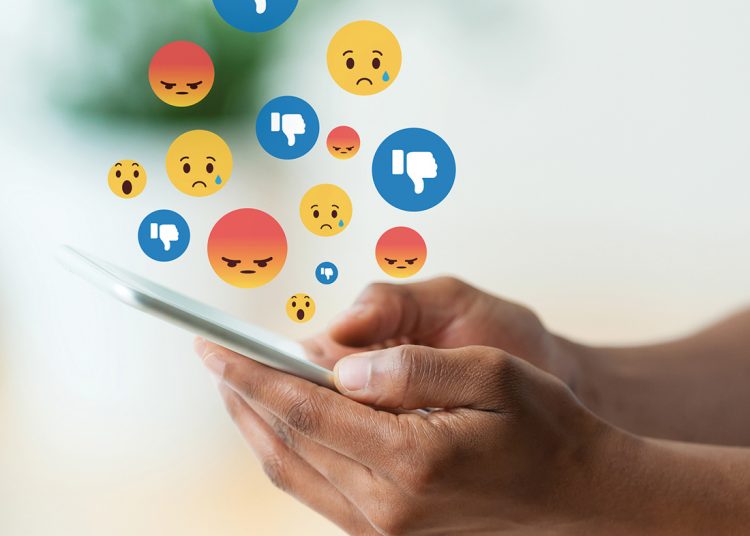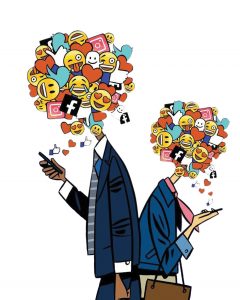
In recent years, TikTok has risen rapidly to become one of the most influential social media platforms worldwide. In today’s digital world, TikTok has become more than just a social media app – it’s a cultural force that is reshaping how people connect, share and seek validation. This article explores the darker side of social media – the side that too often goes unseen until it’s too late.
Social media platforms like TikTok, can lead someone down a dangerous path. A close friend of mine, who was once grounded and full of potential, began to lose himself in pursuing likes and follows. He started oversharing deeply personal moments with strangers, mistaking fleeting online interactions for genuine connection.
Friendships formed through the platform ended in betrayal and disappointment, and his behaviour became increasingly reckless as he chased views, taking risks that could have had life-ending consequences.
What struck me most was how the digital support he received – comments, likes and shares – began replacing the real, face-to-face support of those who truly cared for him. This false sense of belonging and validation pulled him deeper into a world where image trumped reality.
This experience led me to question the broader impact TikTok is having on users, especially young people. As I researched further, I found story after story of individuals falling into similar traps – drawn in by the addictive nature of viral fame and the distorted narratives that unfold like real-life reality TV. It made me wonder: Are parents genuinely aware of how this platform can affect their children’s mental health and self-worth if left unmonitored?
Yes, TikTok has a positive side – creativity, connection and even education. But are these benefits still what define the majority of experiences on the platform? While it provides entertainment and creative outlets for many, the excessive use or addiction to TikTok can have significant negative impacts on individuals’ mental health, productivity and overall well-being.
The darker side
MENTAL HEALTH CONCERNS
Studies have indicated a correlation between excessive TikTok use and increased anxiety, depression and stress. Continuous exposure to short-form videos creates an environment of instant gratification driven by repeated dopamine releases, making real-life tasks appear tedious by comparison.
Dopamine, a neurotransmitter associated with pleasure and reward, becomes toxic when the brain continuously seeks this instant reward, eventually leading to decreased sensitivity and increased cravings. Users who become dependent often experience lower self-esteem due to constant social comparisons, unrealistic beauty standards and validation-seeking behaviours inherent in social media interactions.
REDUCED PRODUCTIVITY AND ATTENTION SPAN
The addictive nature of TikTok stems largely from its algorithm, which is designed to keep users engaged for extended periods. However, this engagement comes at a cost. Users report decreased productivity, as the frequent interruptions caused by short videos disrupt concentration and workflow.
Over time, continuous exposure to brief, stimulating content contributes to shorter attention spans and diminished cognitive capacity, negatively affecting academic or professional performance.
SOCIAL ISOLATION AND REAL-LIFE DISCONNECTION
TikTok addiction can also lead to significant isolation and a disconnection from real-world relationships. Individuals immersed in digital interactions may struggle with face-to-face communication, emotional intelligence and meaningful social connections. Additionally, users often substitute digital validation for genuine emotional support, resulting in loneliness and increased susceptibility to depression.
PHYSICAL HEALTH EFFECTS
Prolonged use of TikTok may also result in physical health issues, including disrupted sleep patterns due to excessive screen time, eye strain, poor posture and reduced physical activity. A chronic lack of sleep and minimal exercise not only affect physical health but also exacerbate mental health problems, creating a negative feedback loop.
HORMONAL AND NEUROCHEMICAL IMBALANCES
The continuous dopamine spikes caused by TikTok addiction can disrupt a person’s hormonal balance, leading to an imbalance in serotonin and cortisol levels.
- Elevated cortisol, the hormone associated with stress, can increase anxiety and negatively impact mood regulation.
- Meanwhile, reduced serotonin levels are linked to increased feelings of sadness, anxiety and depressive episodes, further compounding mental health issues.
Mitigating negative effects
Addressing TikTok addiction requires increased awareness and deliberate strategies such as setting usage limits, engaging in alternative offline activities and seeking professional help if necessary. Fostering a balanced approach to technology use can significantly reduce its harmful effects and improve the overall quality of life.
While TikTok can serve as a source of entertainment and community, its addictive potential poses serious risks to mental, emotional, social and physical health. Recognising these impacts early and taking proactive steps are crucial for mitigating long-term damage and promoting a healthier relationship with digital platforms.
Practical steps include:
- Setting clear daily limits on screen time.
- Taking regular digital detoxes or scheduled breaks from social media.
- Participating in physical activities and hobbies that provide natural dopamine releases.
- Prioritising face-to-face interactions and nurturing real-life relationships.
- Practising mindfulness or meditation to enhance emotional regulation and stress management.
Adopting these habits can improve a person’s mental and physical health, ensuring a balanced, healthier lifestyle.
Take back control
I have also seen a powerful example of recovery and transformation. The same close friend of mine, who had lost his way chasing online validation, has since found his way back. I watched as he slowly regained his sense of purpose, reactivated his passion and – through hard work and focus – consolidated years of experience into a formal qualification. He rebuilt his self-worth and reignited a hunger to create a better future.
It was not easy. It took time and tremendous courage to step away from the toxic circle of false friends and digital enablers. But through conscious effort, he began surrounding himself with purpose-driven people and overcame one of his greatest fears in the process. Witnessing that growth was a proud and humbling moment – proof that healing and purpose are possible, even after deep disconnection.
Let this be a reminder: Platforms like TikTok are powerful, but you must remain more powerful in how you choose to engage with them. The path to recovery, connection and fulfilment starts by taking back control.










